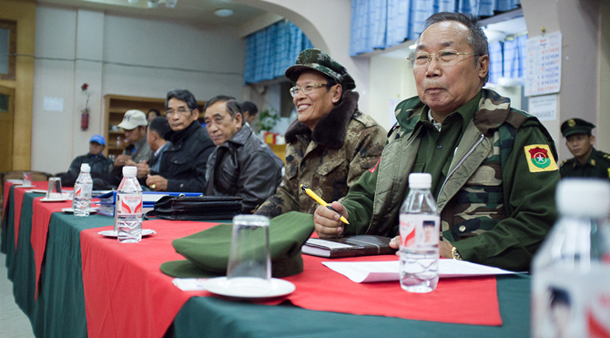Stalled peace talks between the rebel Kachin Independence Organization (KIO) and government negotiators will resume next week in northern Burma, according to sources from both parties.
The talks, which will be the first held inside the country, in Kachin State’s capital Myitkyina, have been planned since March but beset by postponements.
“We agreed in principle to meet in Myitkyina” on May 28, said Min Zaw Oo, director of the ceasefire negotiation team at the government-led Myanmar Peace Center.
Speaking to The Irrawaddy on Tuesday, he did not reveal the agenda or who will act as observers at the meeting, and said those details would be announced as soon as they were agreed upon by both parties. “These are still being discussed with Laiza [location of the KIO’s headquarters],” Min Zaw Oo said.
Fighting has ceased around the KIO’s Laiza headquarters following an offensive by government troops in December and January, during which they seized control of several strongholds outside the city that were held by the KIO’s militant wing, the Kachin Independence Army (KIA). The two sides began peace talks in February and met again in March in Ruili, China.
A third round of talks has reportedly been delayed due to questions about third-party participation. There were rumors that China had pressured the KIO to deny Western observers access to the talks, but the Chinese Embassy refuted those claims.
While the full roster of third-party observers is not yet known, UN representation at the May 28 meeting has been confirmed.
KIO leaders in Laiza were not available for comment when contacted by The Irrawaddy on Tuesday.
James Lum Dau, a KIO executive committee member and the KIO’s representative to the ethnic alliance known as the United Nationalities Federal Council (UNFC), told The Irrawaddy that arrangements for the talks were being managed by the KIO headquarters, which he said even he had been unable to contact in recent weeks.
But, he said: “It is really good that we can meet in our own land, and we have to build mutual trust among us.”
The KIO-KIA remains Burma’s only major ethnic armed group that has yet to reach a ceasefire agreement with Naypyidaw.
Although fighting has subsided over the last few months, a timetable for the return of Kachin internally displaced persons (IDPs) to their homes in Laiza remains unclear. According to local aid workers, thousands of Kachin IDPs are still unwilling or unable to return to their homes and are in desperate need of food.
“The priority is food, as we have to support these IDPs who have lost their homes or who are afraid to go back to their villages due to the insecurity,” said Salang Kaba Doi Pi Sa, head of the Kachin IDP and Refugee Relief Committee (IRRC).
He said shelters for the IDPs have been repaired and are nearing completion ahead of the coming monsoon season. Aid workers stressed that schooling for refugee children remains a concern.
Despite the absence of gunfire in the Laiza region of late, James Lum Dau said clashes continued to occur in Shan State, where Brigade No. 4 of the KIA controls territory. He said the violence there could negatively affect the achievement of a genuine peace.
Kachin leaders confirmed that many IDPs are waiting to return home until a more permanent peace settlement is reached.
Min Zaw Oo said that in addition to a reaching a formal ceasefire agreement, collaboration between the local commanders from both sides was necessary in order for refugees to be able to safely return to their homes. He cited ongoing collaboration in areas currently controlled by the Karen National Union (KNU) as exemplary.
“Refugees’ return is not only [an issue] in the KIO areas, but also in Karen State,” he said.
In talking with Karen refugees, Min Zaw Oo said there were some who wanted to return to their homes and others who planned to wait and see how peace talks progressed before deciding whether to return.

















